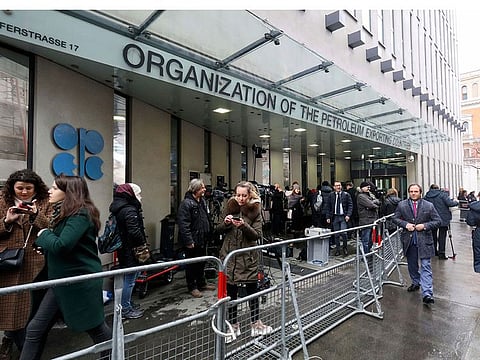This time, an oil deal needs to stick
Laggards no longer have excuses to pay lip service to cuts and then ignore them

Despite the crippling losses caused by the short-term oil price war, a new foundation was introduced in the relationship among OPEC+ countries as well as among oil-exporting countries in general, including the US. The latter for the first time joined the production cuts after having once again turned into an oil exporter.
Previously, Saudi Arabia, the UAE and Kuwait had borne the brunt of OPEC policies, while other members unfortunately took advantage of the Gulf’s keenness to maintain the interests of all oil producing countries. They violated production cut deals over the years, taking over some marketshare that rightfully belonged to these GCC countries.
This systemic approach continued even after the setting up of “OPEC+”, which caused the three countries to lose more of their share in markets and had them incur additional losses.
Belated wisdom
But after the last price war and due to the huge losses suffered by all exporting countries and the closure of US shale oil fields when a barrel of Brent dropped to $16 in April, from $60, countries from inside and outside OPEC+ called for a meeting to stop the collapse of the oil markets. More so, after demand evaporated in the wake of COVID-19.
As was to be expected, the meeting resulted in an agreement to reduce production by 9.7 million barrels a day within OPEC+, and 20 million barrels a day when producers from outside join next July. To further support this approach, the three Gulf states announced a voluntary reduction of 1.18 million barrels per day to quickly drain out the surplus from markets and thus support prices, which doubled in the middle of last week.
The price of a Brent barrel shot up to $42, before dropping to slightly lower than $40 due to a drop in demand and speculative selling. These sincere policies by the Gulf producers coupled with Russia and most of the OPEC+ countries’ commitment to the new cuts were unfortunately met by outright cheating by Iraq, Angola, Kazakhstan, and Nigeria, which did not adhere to production quotas.
Heavy pressure
At the last meeting, these countries were told in no uncertain terms to restrict production, and they have promised to do so in order to avoid entering a new - and painful - price war.
This means that the new rules for the post-price war environment are clear to everyone. Either have a total commitment or no commitment, especially after the US joined in the deal. This will place enormous pressure on those countries not sticking to their part of the deal
Oil producers have but two options - either engage in a price war, which means more production and fewer returns, or stick to the agreements limiting production but with the chance for greater returns.
This has become quite clear to all oil producing countries. Taking the first choice will surely lead to a rapid depletion of exhausted wealth, creating complex economic difficulties.
Have more for longer
However, if they opt out for the other, it will help extend the life of their oil-generated wealth and obtain returns that cover most of the budgetary needs and finance development programmes.
The second approach seems to be the one that will be adopted for the collective interest of all oil-producing countries, but this does not mean that there will be no circumvention of agreed-to cuts. Yet, if that happens, such actions can be easily addressed given the influence of the major powers adopting the new agreement.
As for prices, they will undoubtedly witness fluctuations, some of which will be sharp and similar to what happened when prices dipped by more than 9 per cent, due to unstable demand caused by a continuation of COVID-19 lockdowns and from speculation.
However, the price of a Brent barrel recovered at beginning of this week to around $40.
Yet, commitment to the new agreement will certainly guarantee an upward mobility for prices until they reach pre-crisis levels, which will be a significant gain for all oil-producing countries.
- Mohammed Al Asoomi is a specialist on energy and Gulf economic affairs.









